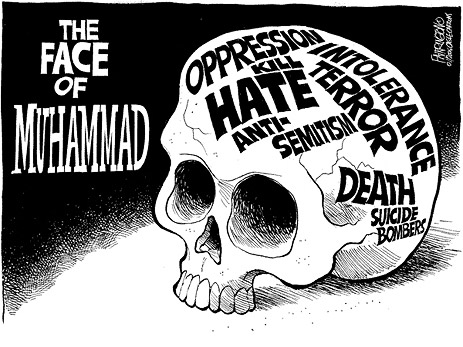Image Resource Bank
Image Gallery |  12 of 15
12 of 15 
The Face of Muhammad
On September 30, 2005, the Danish newspaper Jyllands-Posten published twelve editorial cartoons, most of which depicted the Prophet Muhammad in ways that perpetuated several negative stereotypes commonly associated with Muslims, such as violence, intolerance, and mistreatment of women. Following their appearance in Jyllands-Posten, the cartoons were re-printed in several newspapers of neighboring European countries and Egypt, but at first they caused little public outcry. It was not until early 2006 that public demonstrations and protests denouncing the Danish cartoons escalated, resulting in the vandalizing of the Danish embassies in Damascus and Beirut and a boycott of Danish imports by some Muslim-majority countries. As a rejoinder to this violence, political cartoons such as this one began appearing in the Western media. Evident in the Jyllands-Posten as well as this “Face of Muhammad” cartoon is the use of synecdoche where the Prophet Muhammad stands in for Islam in general or all Muslims throughout history. In this particular cartoon, the character traits inscribed on the surface of Muhammad’s skull, ordinarily hidden from view but resting just below the surface, reflect the inner psychological character of Islam’s central prophetic figure. Also, by using a skull to depict the real “face of Muhammad,” the cartoonist reinforces the association of Muhammad and Islam with death and dying.
Name: “The Face of Muhammad”
Material: Digital image
Size: Unknown
Place of Origin: Created by Brian Fairrington
Date: 2006
Location: Unknown
Source and Registration#: Political Cartoons. Link to resource![]() (accessed June 24, 2010).
(accessed June 24, 2010).

 John Woods
John Woods
Professor of Iranian and Central Asian History and of Near Eastern Languages and Civilizations, The University of Chicago
 Alexander Barna
Alexander Barna
Outreach Coordinator, Center for Middle Eastern Studies, University of Chicago




